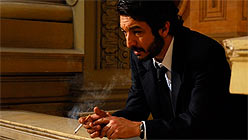If you’re not a historian of Argentine politics, then your knowledge of the country’s recent past may be comparable to mine. In other words, I did see the musical Evita on stage, and, unfortunately, years later on screen. With this year’s Oscar winner for Foreign Language Film, I had to do some research to absorb the full impact of The Secret in Their Eyes (El Secreto de Sus Ojos) .
According to Argentina’s profile on the U.S. Department of State’s web site, from 1976 to 1983, thousands of citizens “disappeared” under the military dictatorship that ruled the country. The film is set both during and after this period of turmoil, and evokes a lawless age, when brutal crimes went routinely unsolved. Ordinary citizens disappeared right out of their everyday lives. Family members were suddenly bereft, and then haunted by the unexplained absence of a loved one.
If, as the film suggests, the police force colluded with the government, and were of no help to the grieving families, to whom then could they ask for retribution? The Secret in Their Eyes attempts to answer that question by focusing on the death of one particular woman, Liliana. By devising a non-linear structure, the director/screenwriter, Juan José Campanella, turned an otherwise conventional narrative into a memory play, elevating the story into something more than a didactic history lesson.
The main character is an uncorrupted official in the justice department named Benjamin Esposito. The movie, as it plays with time, is bookended by the present, after his retirement. Through his memory of the investigation into Liliana’s death, we witness the emotional devastation of a husband, after the rape and murder of his lovely, young wife. This story runs parallel to Benjamin’s own, which involves the unrequited love he feels for his boss, an upper class lawyer who is out of his league. The use of these extended flashbacks is reminiscent of scenes from The English Patient (1996), or Casablanca (1942), in which the pursuit of love is trivial while war guts innocent people to the bone.
The Secret in Their Eyes is this director’s second film to be nominated for a foreign language Academy Award. The first, Son of the Bride (2001), was an achingly sentimental account of one man’s midlife crisis. It lost the prize that year to No Man’s Land, from Bosnia and Herzegovina, which documented the opposing sides of that conflict. Among the category’s losers this year were Michael Haneke’s The White Ribbon and Jacques Audiard’s A Prophet. The Secret is no more technically accomplished, nor more affecting than either of those films. Was it the combination of romantic longing, suspense and regret that swayed the sympathies of the Academy members? Regardless, what lends this film its power are the personal and political traumas that Argentina sustained during its “Dirty War.” And, despite a maudlin final scene, I couldn’t begrudge the film its happy ending: after all that country’s sorrow, it felt earned.


